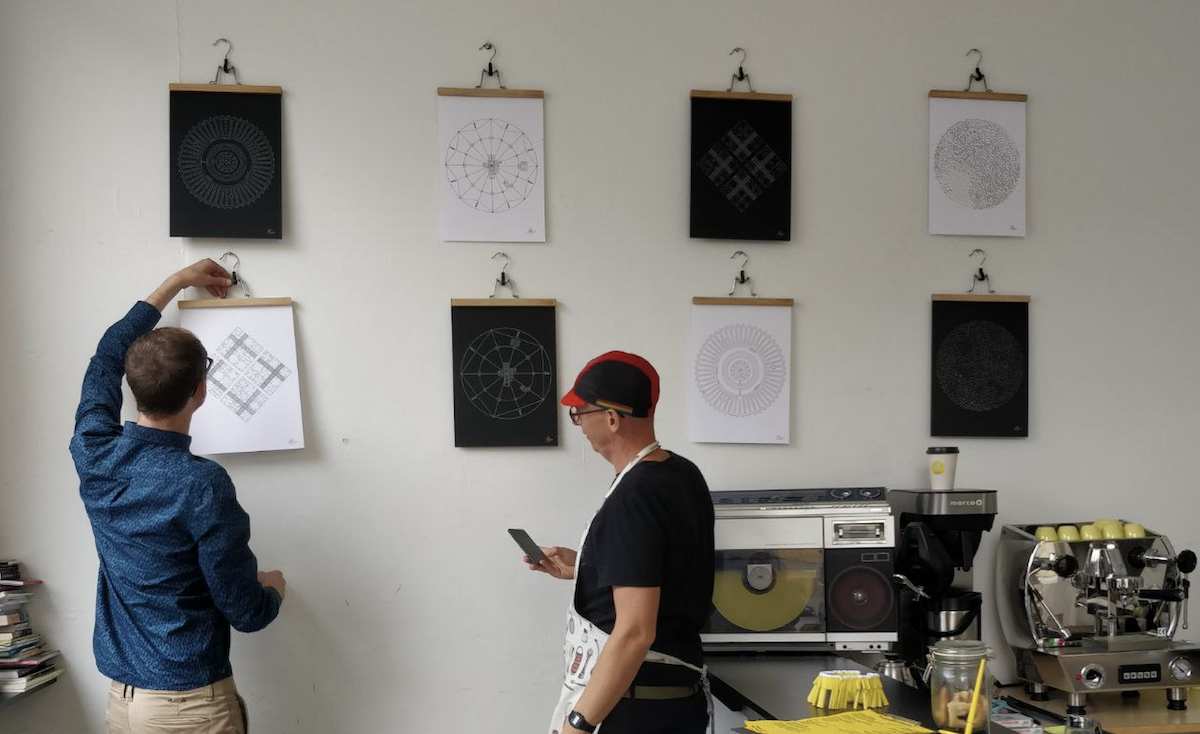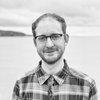Tenday Notes 29 Aug - 7 Sep

Every ten days I share a quick digest of what I've been working on. Here's the latest. You can find more in the series here.
The opening of Ekistics - my exhibition of pen plotter art went really well. A big collection of my friends came down, many of whom I haven’t been able to see in months, and it was great to catch up with everyone. I had forgotten how nice it is to buzz around a room chatting casually to people.

I don't think I've shared with you the "manifesto" I wrote for the project, which I put together to figure out what I wanted to say. Here it is in full. It's a little pretentious, but that's part of the fun of writing something like this, isn't it?
My name is Duncan and I collaborate with robots to make art that sits on the boundary of the physical and the digital, the expected and the unexpected, the imaginary and the real. Through careful control of random numbers, I create worlds of possibilities that result in unique, intricate artworks that are never the same twice.
The eight pieces that I've chosen to showcase centre around the theme of utopia. The Dutch planners that built Gothenburg drew inspiration from Italian Renaissance architects like Pietro di Giacomo Cataneo and Antonio di Pietro Averlino (Filarete), who planned out complex "ideal cities" in response to the squalor of the medieval era. An ideal city, they believed, would be the image of a perfect society.
Today, it's harder than ever to conceive of a perfect society. Every moment of the day, we're exposed to news broadcasts and social media aflame with the latest tragedy or outrage. Even in our spare time, we watch grimly dystopian sci-fi or dark crime dramas. Meanwhile, the climate crisis worsens and we fear what kind of a world we leave our children.
I believe we should start telling new stories. Stories of people building fair, equitable societies, in balance with their environments. Stories of communities coming together to solve their problems without conflict. Stories of human kindness and ingenuity. While we must acknowledge that reality is messy, a civilisation is shaped by the stories that it tells. Imaginary utopias, like the ones I depict in these works, are how we begin building a better world.
I’m in the process of writing up the project on my website in full, with photos of all the pieces, so stay tuned for that.
I really enjoyed putting the exhibition together. The whole thing felt very satisfying and I wanted to reflect a little on why, in case it helps others figure out how to identify projects that they'll find satisfying too. I think that the main reason it was so satisfying is that I knew in advance what I wanted from it. I wanted to create something that:
- said something worthwhile
- was understandable
- only I would have made
- had clear edges
Let's talk about each of those goals in a little more detail.
Saying something is very easy, but saying something worthwhile is of course harder. To me, "worthwhile" means a degree of originality and importance. In this case, I wanted to talk about how we're burying ourselves in dystopian visions through the news and through Netflix, and how that is negatively affecting our ability to imagine and therefore build a better world. I think that's not being widely said, and it's important.
I think that's a fairly clear message, too. A lot of art is conceptual, ironic, or political to the extent that a general audience doesn’t "get" it. It just ricochets around the echo chamber of the art world. While it's true that not all art is aimed at a general audience, mine is. My core message - that imagining better worlds is a valuable and useful thing to do - is something that almost anyone can understand and (hopefully) agree with. And when I've explained the work to people, they have indeed understood. That feels good.
It was important to me that the work was original, as well as the message. One of the joys of generative pen plotter work is that not many other people have explored this space and so there’s a lot of uncharted territory. I’ve not found anyone else exploring generative urbanism with plotters, and that’s exciting. It was also exciting to be able to make something out of decades of mild obsessiveness about ideal cities.
Finally, this project would not have been satisfying if I hadn't defined its edges very early on. The constraints imposed by the format of the exhibition space (eight sheets of A3 paper) and by the amount of time I could realistically spend on it (before the deadline of opening day) set clear boundaries that I could then imagine within. If you're struggling to turn a vague idea into something real, my number one tip is to give it some edges. After you've decided what it's not going to be, it's much easier to decide what it will be.
I'll add an extra note to this point about edges, which is to decide when a project will finish before it starts. Starting a podcast? Make ten episodes and then end it. If loads of people love it, and/or you're enjoying making it, then you can always make a second set of ten episodes. I've decided that the end of this project will be the aforementioned write-up on my website. I will probably do more work with generative urbanism in the future, but ending this project frees up space to do something new and exciting, and I am not short of ideas.
About a week ago I was recommended an app called Roam Research by a friend of mine. It’s basically a note taking system that lets you link easily between notes. Very handy for tracking everything that’s going on in a busy life.
But there were a few things that stopped me signing up to give it a try. The first was a lack of a mobile app or an API. And the second was the cost - a cool $15 per month for note-taking? That feels a bit steep. (Roam says “you’re not our target user if Roam is worth less than Netflix”, lol. At least Netflix has a mobile app...)
So instead I did some googling and the best free alternative seems to be Obsidian, which runs on top of a folder of plain text notes. I’m giving that a go. But I’m yet to come up with a good solution for editing those notes on my phone. Maybe I'll just stick with my existing Simplenote setup? Hmm...
Do you have a great system for note taking? I’d like to hear about it. Hit me up.
As mentioned a few weeks back, I've been looking for a way to turn my personal site from a collection of projects into something simpler, more focused on selling my services.
The answer did in fact turn out to be static site generator Eleventy, which is a bit of software that allows you to write flexible, smart code to create a beautiful page that loads extremely fast. To that end, I've started Picallili's "Learn Eleventy From Scratch" course, which I'm planning to work through over the course of the next week.
The course walks you through the creation of a slightly complex website. So I'm hoping that the creation of a simple website will be trivial after finishing the course. My web design skills have always been a little on the basic side, especially when it comes to the technology, so it's going to be nice to dedicate the next week or two to levelling that up.
The language used by scientists has changed dramatically over the past 175 years. To track it, dataviz designer Moritz Stefaner analysed every issue of Scientific American to see the relative usage of different words.
For example, the use of the word "certainty" peaked in 1850, while use of the word "uncertainty" peaked in 2019. "Machine" peaked in 1910, while "system" peaked in 1959. "Weather" peaked in 1929, and "climate" peaked in 2010.
Read the visual analysis over on Scientific American's website, where you can also explore the entire dataset yourself.
Matt Webb has an interesting post about the microCOVID project - named after a unit of risk defined as one-in-a-million chance of catching COVID-19. Their explanation:
For example, if you live in a region where about 1 in 1,000 people currently has COVID, then you could calculate based on studies of other indoor interactions … that meeting a friend for coffee indoors has about a 1 in 17,000 chance of giving you COVID. Such small numbers are hard to think about, so we can use microCOVIDs instead. Your coffee date would be about 60 microCOVIDs. One benefit of using microCOVIDs is that you can straightforwardly add up microCOVIDs to estimate your risk over longer periods of time.
The numbers are different depending on where you live, but there's a calculator for a lot of common activities - a car ride with someone for 15 minutes, a 60-minute trip to the supermarket, going to a bar, eating at a restaurant (both indoor and outdoor).
I found the results really interesting. In England, eating in a restaurant outdoors is a 30 microCOVID risk, while eating in a restaurant indoors is a 500 microCOVID risk. Going to the supermarket is 20 microCOVIDs. Getting "physically intimate" with someone is 400 microCOVIDs. Going to a bar for a couple of hours is 3,000 microCOVIDs.
I've found that I'm rather more cautious than most about the risks of doing, well, everything at the moment. From that perspective, this is a tremendously useful tool for understanding how those risks relate. I feel a lot better about going to the supermarket and eating outdoors than I did before. I also feel a bit better about riding the bus. I might try tracking my personal microCOVID count for a while, to see how it totals up over a week or so. Keeping it below 200 would limit my chances of catching COVID to about 1% per year, which feels like a nice total to aim for.
I'm easing back into work on Loud Numbers, my upcoming data sonification podcast, after taking a bit of a break during August for holidays and client work. The system I set up to load, check, normalise and sonify data for the Brexit sonification worked great, but I was a little concerned that it wouldn't transfer so easily to the new one I'm working on - about economic recessions.
Turns out I needn't have worried - it was trivial to just point the code at the new data file, adjust the normalisation parameters, and then be ready to start playing back audio. Setting that audio up then took a little longer (because I knew how I wanted it to sound and that took time to figure out), but I was still able to go from no sonification at all to it being ready to hand over to Miriam (my half of the work is to make basic sonifications, hers is to make them sound like music) in the space of about 90 minutes, which is wonderful. We're finally starting to build a production pipeline that will make it a lot easier to make sonifications in the future, and perhaps one day even release a code library. That would be nice, wouldn't it?
Anyway, one step at a time. Recessions have been sonified. The next job is to script it...
I heard a clip of myself speaking from about 2011 the other day, and I noticed something strange: My accent was different. I had a little bit of a London accent going on, which is perhaps unsurprising as I'd been living in London for about four years by that point.
This kind of thing has happened before. I had an extremely posh British accent when I first moved to the UK when I was eight years old or so, which I lost extremely quickly when I got mocked at school. I acquired a midwestern twang in my speech in the mere 10 months that I spent in Oklahoma.
The way you speak is a weirdly personal thing, and so it's weird when it changes - despite the fact that we have all died many times. You don't imagine the way you speak changing, but mine clearly has and most likely still is. In fact, based on my experiences so far I seem quite susceptible to it.
I wonder what forces are shaping the way I speak today. I wonder how different it'll be in another decade or so. I wonder who I'll be then.
I spent most of the day today watching the S-H-O-W conference online. It had the best lineup of speakers I've seen at any of the dataviz conferences this year, and it's run by a small Dutch consultancy, so I wanted to support it.
The talks were solid, and there were only a handful of technical problem - fewer than most of the digital conferences I've attended. I loved that the organisers got a real band to play live music during the interval. I loved that my dog Laika got a shout-out from Miriam (while talking about her book). I didn't love the talks that were just "here's a big pile of things I've done" - which I feel work less well online than they do in person (and even then, they're still my least favourite genre of conference talk). I especially loved that every single speaker was a woman.
The videos should be online in due course, so if you're in a viz-adjacent field and want some inspiration on data physicalisation, uncertainty visualization, data feminism and much more, then keep an eye out.
Now that my shoulder has mostly recovered from my bike crash in June, I've been itching to get to doing some longer walks again. So over the weekend, we walked 26 kilometres from Gothenburg to Ytterby (not the one where Ytterbium was discovered, unfortunately), which is up at the junction where the Göta Älv river splits into two.
I was a bit worried about Laika managing the distance, but she did fine - still pulling on the leash at the end. I was also a bit uncomfortable taking the train home again, and no-one on board was wearing a mask, but it was just 20 minutes and the train wasn't close to full, so it felt okay on the microCOVID risk scale.
Some of the delights we enjoyed along the way were a Buddhist temple, the scene of my bike crash, a cable ferry, Gothenburg's equivalent of the Thames Barrier, a Communist school, a 12th century church, and a couple of downpours. Downpours aside, it was a lovely walk - and extra-lovely to cover some previously-unexplored terrain.
Finally, I'll leave you this week with a guide to pricing creative work from Marco Vanini (via Gabrielle Merite). Here's the key bit:
Cheap work is unappreciated work. Cheap work is destined to be battered, dragged, and thrown around like a ragdoll. In fact, charge your client cheap and be ready for what-ifs, let's do what my cat suggested, and who knows what sparkle of spontaneous capricious charm.
The last paragraph, in particular is golden. Don't miss it.

